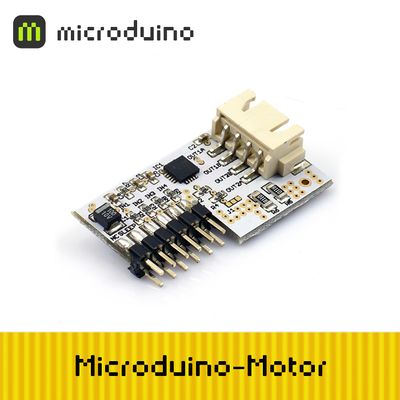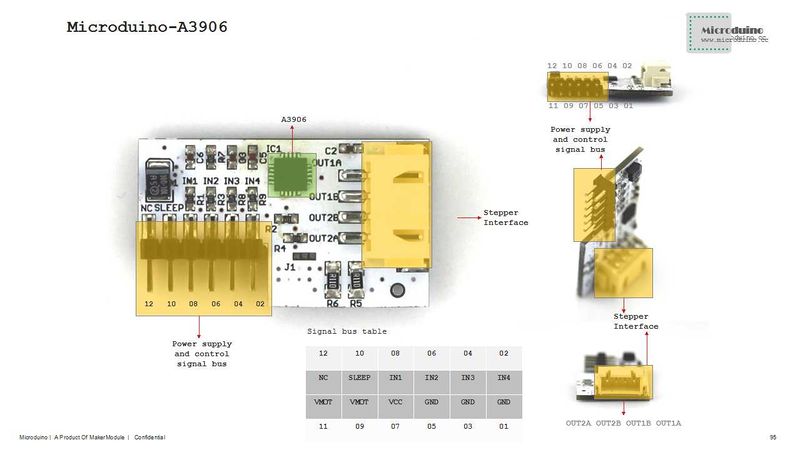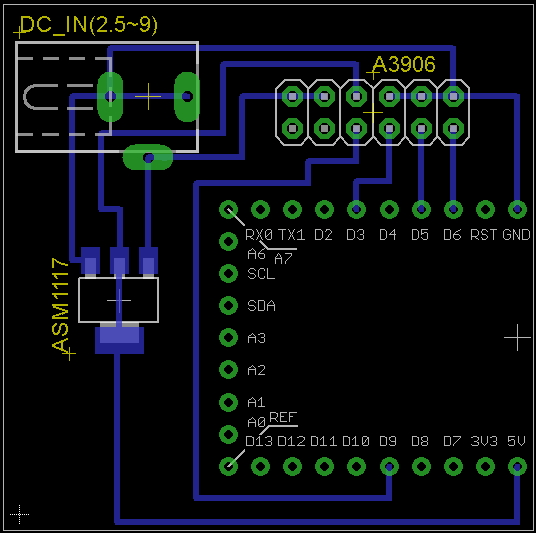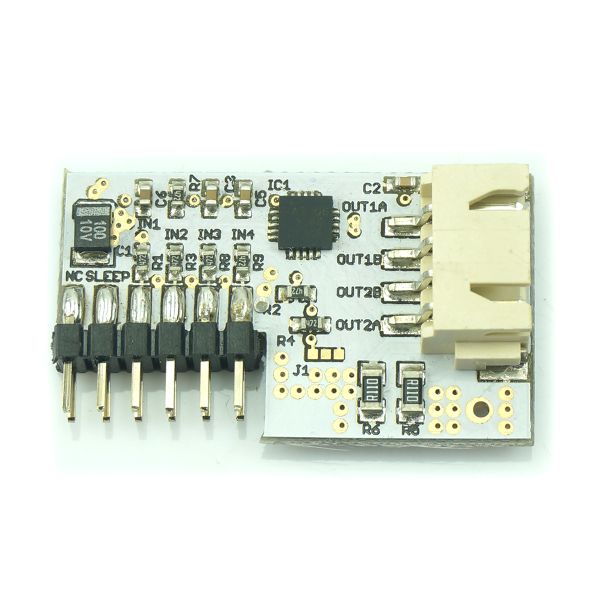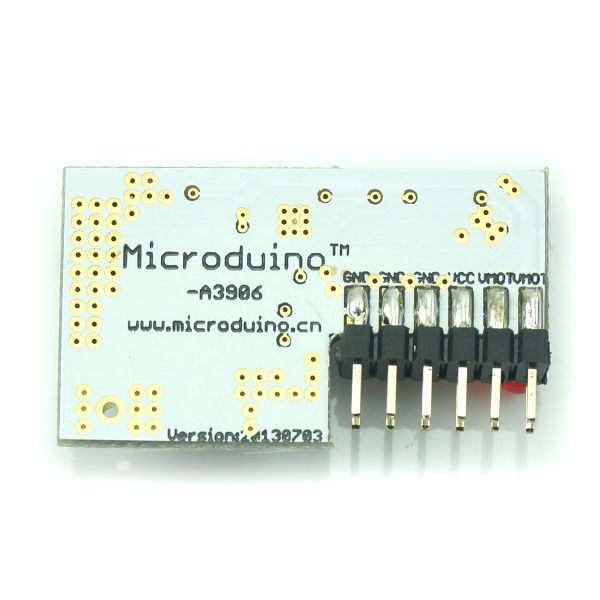|
Microduino-Motor is a motor drive controller with the PWM control function. It can be used to control dual full bridge low voltage stepper motor, single or dual DC motor, widely applied in smart car and robot control.
Feature
- Internal PWM current limit control
- Synchronous rectifier, capable of reducing power consumption
- Under-voltage lockout
- Low RDS(on)output
- Dc motor braking mode
- Sleep function
- Overcurrent protection
- Overheating Shutdown
- Small size
Specification
- 20 pins
- 4 mm×4mm×0.75mm size
- With QFN package and naked pads to dissipate heat.
- 100% Matte tin plated pin
Electrical specifications
- VCC voltage:5V
- VMOT voltage:2.5~9V
Pin Description
| Microduino Motor Pin |
Microduino Pin |
Function
|
| SLEEP |
Microduino IO port |
Sleep logical input, low active
|
| IN1 |
Microduino IO port |
Control input
|
| IN2 |
Microduino IO port |
Control input
|
| IN3 |
Microduino IO port |
Control input
|
| IN4 |
Microduino IO port |
Control input
|
| VMOT |
Connect external power |
external power to motor
|
| VCC |
VCC |
power to A3906 and Microduino
|
| GND |
GND |
Common Ground
|
Document
Driver chip:A3906 File:A3906-Datasheet.pdf
Development
DC motor wiring
Connect one DC motor to OUT1A,OUT1B, the other to OUT2A,OUT2B.
DC motor control mode
| IN1 |
IN2 |
IN3 |
IN4 |
OUT1A |
OUT1B |
OUT2A |
OUT2B |
Function
|
| 0 |
0 |
0 |
0 |
Off |
Off |
Off |
Off |
Close
|
| 1 |
0 |
1 |
0 |
High |
Low |
High |
Low |
Forward
|
| 0 |
1 |
0 |
1 |
Low |
High |
Low |
High |
Backward
|
| 1 |
1 |
1 |
1 |
Low |
Low |
Low |
Low |
Stop
|
Step motor wiring
- Connect step motor to Microduino Motor module:
- The four-wire two-phase step motor has two sets of coil A and B. Each group of coil's resistance is very small, only a few ohm.
A and B group are absolute insulated and disconnected. Just use a multimeter to measure, the one connected belongs to one group.
- After identifying the A and B group, just connect one group to (OUT1A, OUT1B), the other to (OUT2A, OUT2B).
Step motor control mode
| IN1 |
IN2 |
IN3 |
IN4 |
OUT1A |
OUT1B |
OUT2A |
OUT2B |
Function |
|
| 0 |
0 |
0 |
0 |
Off |
Off |
Off |
Off |
Disabled |
Disabled
|
| 1 |
0 |
1 |
0 |
High |
Low |
High |
Low |
Full Step 1 |
1/2 Step 1
|
| 0 |
0 |
1 |
0 |
Off |
Off |
High |
Low |
|
1/2 Step 2
|
| 0 |
1 |
1 |
0 |
Low |
High |
High |
Low |
Full Step 2 |
1/2 Step 3
|
| 0 |
1 |
0 |
0 |
Low |
High |
Off |
Off |
|
1/2 Step 4
|
| 0 |
1 |
0 |
1 |
Low |
High |
Low |
High |
Full Step 3 |
1/2 Step 5
|
| 0 |
0 |
0 |
1 |
Off |
Off |
Low |
High |
|
1/2 Step 6
|
| 1 |
0 |
0 |
1 |
High |
Low |
Low |
High |
Full Step 4 |
1/2 Step 7
|
| 1 |
0 |
0 |
0 |
High |
Low |
Off |
Off |
|
1/2 Step 8
|
Application
Program download
Test program:File:Program Test A3906.zip
A3906 contorls two DB motors
- Use Microduino core and Microduino A3906's control function;
- Prepared hardware: Microduino FT232R,Microduino Core, Microduino Motor and two DC motors as well as a power supply(2.5~9V);
- Prepared software: Microduino test program(Arduino part) and Arduino IDE(version 1.0 and higher);
- Start Arduino IED,open the Microduino test program, choose "Microduino Core (Atmega328P@16M,5V)" and download directly;
How to make a pegboard with Microduino core and Microduino Motor connected:
- Set up the circuit on pegboard as follows (blue line at the bottom)
- Microduino Motor drive DC motor test:
- Connect 5V or 9V power, the motor don't rotate initially:
- Start Arduino IED serial monitor
- Input 0000, enter, two motors don't rotate
- Input 0101, enter, Two motors rotate forward
- Input 0110, enter, one motor rotates forward and the other backward
- Input 1001, enter, one motor rotates backward and the other forward
- Input 1010, enter, two motors rotate backward
- Input 1111, enter, two motors stop
Bug
History
Pictures
Video
|
